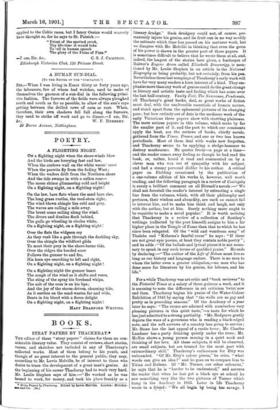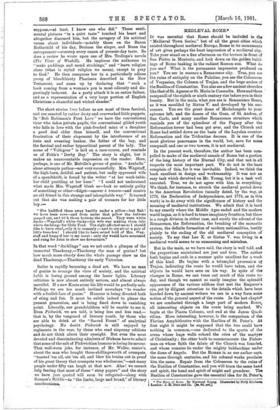BOOKS.
STRAY PAPERS BY THACKERAY.*
THE editor of these "stray papers" claims for them no con- siderable literary value. They consist of reviews, short stories, verses, and sketches not included in any of Thackeray's collected works. Most of them belong to his youth, and though of no great interest to the general public, they may, according to Mr. Lewis Melville, be of interest to those who desire to trace the development of a great man's genius. At the beginning of his career Thackeray had to work very hard. Mr. Leslie Stephen says of him:—" He worked as he was bound to work, for money, and took his place frankly as a • Stray Papers by Thackeray. Edited by Lewis Melville. Londonv Hutchins son and Co. (64.1
literary drudge." Such drudgery could not, of course, per- manently injure his genius, and its fruit can in no way modify the estimate which time has passed on his maturer work, but we disagree with Mr. Melville in thinking that even the germ of his power is shown in the greater part of these papers. It is sometimes difficult to believe that he wrote them at all, and, indeed, the longest of the stories here given, a burlesque of
Bulwer's Eugene Aram called Elizabeth Brownrigg, is men- tioned by Mr. Leslie Stephen in an article in the National Biography as being probably, but not certainly, from his pen. Nevertheless these last scrapings of Thackeray's early work will have for very many readers a keen interest of a kind. They em- pbasisemore thanany work of genius could do the great change in literary and artistic taste and feeling which has come over the last half-century. Vanity Fair, The Newcomee, Pendennia,
all Thackeray's great books, deal, as great works of fiction must deal, with the unalterable essentials of human nature, and stand apart from the ephemeral pictures of its changing pose; but how entirely out of date is the mediocre work of the early Victorians these papers show with startling plainness. The more serious papers in this volume, which make by far the smaller part of it. and the part to which our comments
apply the least, are the reviews of books, chiefly novels, gathered from the Times, Fraser, and one or two lees known
periodicals. Most of them deal with works now forgotten,
and Thackeray seems to be applying a sledge-hammer to destroy mushrooms. He quotes freely—a page at a time—
and the reader comes away feeling as though he had read the book, or, rather, heard it read and commented on by a clever man who was out of sympathy with his subject, and had a strong personal dislike to his author. A critical paper on Fielding occasioned by the publication of a one-volume edition of his works is, however, well worth
reading, and the following paragraph in a review of Coningsby
is surely a brilliant comment on all Disraeli's novels :—" We shall not forestall the reader's interest by extracting a single line from the volumes, which, with all their philosophy and pertness, their wisdom and absurdity, are such as cannot fail to interest him, and to make him think and laugh, not only with the author, but at him. Surely nothing more ought to be requisite to make a novel popular." It is worth noticing that Thackeray in a review of a collection of Southey's writings (collected by the poet himself) assigns to him a far higher place in the Temple of Fame than that to which he has since been relegated. Of the "wild and wondrous song" of Thalaba and "Kehama's fearful curse" he says : "If these are not great epic poems, at least they contain noble poetry "; and he adds : " Of the ballads and lyrical pieces it is not neces-
sary to speak in any such terms of qualified praise." He ends by declaring:—" The author of the Lzfe of Nelson must live as long as our history and language endure. There is no man to whom the latter owes a greater obligation,—no man who has done more for literature by his genius, his labours, and his life."
For a while Thackeray was art critic and "book reviewer" to the Pictorial Times at a salary of three guineas a week, and it is amusing to note the difference in art criticism 'twixt now and then. Thackeray begins his praise of the Water-Colour Exhibition of 1843 by saying that "the walls are as gay and pretty as in preceding seasons." Of the Academy of a year later he says: 'The rooms are adorned with numberless very pleasing pictures in this quiet taste,"—a taste for which he has just admitted to a strong partiality. "Mr. Redgrave gently depicts the woes of a governess who is reading a black-edged note, and the soft sorrows of a country lass going to service ; Mr. Stone has the last appeal of a rustic lover; Mr. Charles Landseer has a party drinking quietly under the trees; Mr. McNee shows a young person musing in a quiet nook and thinking of her love. All these subjects, it will be observed, are small subjects, but are treated for the most part with extraorrlinory Thackeray's enthusiasm for Etty was unbounded. "Of Mr. Etty's colour pieces," he cries, "what words can give an idea ?" and he goes on to compare him to Titian and Rubens. Of "Mr. Turner, our other colourist," he says that he is "harder to be understood," and assures the reader that when he last got a black eye at school be saw something very like the two pictures of Turner which hung in the Academy in 1843. Later in life Thackeray wrote to a friend : "We all begin by being too savage, I suppose,—at least, I know one who did." These senti- mental pictures "in a quiet taste" touched his heart and altogether disarmed him, but the savagery of his satirical verses about individuals—notably those on the Baron Rothschild of his day, Braham the singer, and Bunn the entrepreneur—overstep every canon of present-day taste. So does a review he wrote upon one of Mrs. Trollope's novels (The Vicar of Wexhill). He implores the authoress to "make puddings and mend stockings," and "leave religion alone (what is styled religion we mean), except to pray to God." He then compares her to a particularly odious group of bloodthirsty Pharisees described in the New Testament, and sums up by declaring that "such a book coming from a woman's pen is most odiously and dis- gustingly indecent. As a party attack it is an entire failure, and as a representation of a very large portion of English Christians a shameful and wicked slander."
The short stories 1ere before us are most of them farcical, and are enacted by rather dusty and overworked little puppets, In "Bob Robinson's First Love" we have the conventional vicar who takes private pupils, the conventional gilded youth who falls in love with the pink-frocked minx of a daughter a good deal older than himself, and the conventional frustration of their elopement by the interference of an irate and swearing banker, the father of the boy, and the farcical and rather hypocritical parent of the lady. The scene of " Voltigeur " is laid on a race-course, and reminds us of - Frith's "Derby Day." The story is slight, but it makes an unaccountable impression on the reader. Here, perhaps, is one of Mr. Melville's germs of genius. " Arabella" alone attempts pathos—not very successfully. Mrs. Wagstaff, the high-born, dutiful, and patient, but sadly oppressed wife of a spendthrift, is found by the writer "at her work-table, her child prattling at her knee." "I could not understand what made Mrs. Wagstaff blush so—look so entirely guilty of something or other—fidget—answer a &avers—and receive an old friend in this strange and inhospitable way." It turned out that she was making a pair of trousers for her little boy "She huddled them away hastily under a pillow—but Bah ! we have keen eyes—and from under that pillow the buttons peeped out, and wi•li those buttons the secret. They were white ducks —Wagstaff's white ducks—his wife was making them into white ducklinga for little Fred. The sight affected me so I should like to have cried, only it is unmanly ;—and to cry about a pair of little breeches! I should like to have seized hold of Dirs. Wag- staff and hugged her to my heart : only she would have screamed and rung for John to show me downstairs."
In that word " ducklings " can we not catch a glimpse of the immortal Thackeray,—Thackeray the man of genius ? but how much more clearly does the whole passage show us the dead Thackeray,—Thackeray the early Victorian.
Satire is rapidly becoming a dead art. We have no WM of genius to scourge the vices of society, and the satirical habit is losing ground among the lesser lights. Literary criticism is now almost entirely serious, and almost always mercifuL If a new Keats arose his life would be perfectly safe. Perhaps we are too much inclined nowadays "to wonder with a foolish face of praise." Humour is being divested both of sting and fun. It must be subtle indeed to please the present generation, and is being fined down to vanishing point. Literally, our grandchildren will be unable to see it. Even Pickwick, we are told, is being less and less read,— that is, by the vanguard of literary youth, by those who are able to drink at the "Sacred Fount" of analytical psychology. No doubt Pickwick is still enjoyed by regiments in the rear, by those who read sixpenny editions and do not think about their eyesight. But even the most devoted and discriminating admirers of Dickens have to admit that some of the salt of Pickwickian humour is losing its savour. That well-worn joke, for instance, of Mr. Weller, senior's, about the man who bought three-shillingsworth of crumpets, "toasted 'em all, ate 'em all, and blew his brains out in proof of his great theory that crumpets was wholesome,"—not many people under fifty can laugh at that WM. Alas t we cannot • help fearing that most of these "stray papers" and the story we have just quoted will soon be relegated—along with .8am:ion's Riddle—to." the limbo, large and broad," of literary







































 Previous page
Previous page